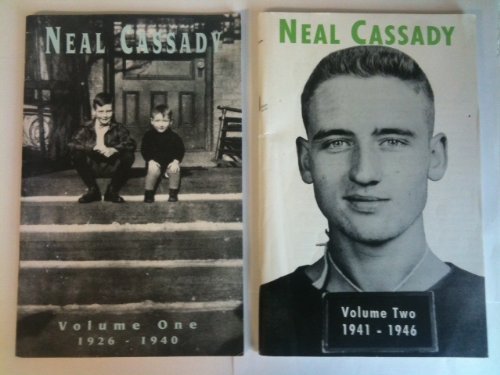INTRODUCTORY NOTE
The Colorado Daily, March 9, 1976
In the footsteps of Neal Cassady’s ghost

By Joe Bageant
By the time of his death in Mexico in 1968 at the age of 43, Neal Cassady’s turbulent passage across the American landscape had already left its mark upon literature. This was mostly through his effect on writers of the Beat Generation, the key figures of which were his closest friends. His attitude, mores than the small body of writing he left behind, was a source of inspiration to such people as Kerouac, Ginsberg, Corso, Burroughs, and Kesey. This attitude might best be described as that of an American Zen Buddhist Drugstore Cowboy Poolshooting Mystic, with a terrible fascination for the relationship between velocity and life.
Early childhood found him growing up in the wino dive hotels of lower Denver, while his last years saw him careening through the acid antics of Key Kesey’s now famous Merry Pranksters. In between he left nothing untouched. Poetry, jazz, cafeterias, fast cars, women, and drugs, all were part of his experientially based philosophy.
As in the 60s, a new wave of interest turns toward the Beat Scene, Cassady’s role looms ever larger for its inclusiveness. The search for the visions of a man now gone is best begun by experiencing the sounds and moods from which his inspiration was drawn. Much of Neal Cassady’s were drawn from his brooding Larimer Street beginnings.
———-

Cassady and Leary (forefront)
There are no last names on skid row, except on police blotters. Hence, the ragged tramps at the Western Palace Hotel all have vague names like Slim, Red, Shorty, and Boe. These bums are rich as winos go, with the most of them living on small pensions; and the Western is what is called in these circles a solid flop (meaning that most of its residents live here permanently).
Housing about 60 wined-out old men who manage to come up with the $16.20 a week required to call it home. A verifiable address like this is as extravagant as life gets for those drowned in a well of muscatel. Scaley and bruised white ankles of their less fortunate brothers can be seen protruding from under dumpsters or jutting from phone booths up and down Champa street. February’s nasty and biting winds have no favorites but prey upon the derelicts of the Larimer district with special viciousness.
Torpid life in flop America has remained unchanged since the turn of the century and the smiling women with a cause still glom oatmeal onto tin plates as policemen pick up comatose bodies clad in long overcoats, taking care to avoid the areas of the rancid armpit or the slimy sock. But the company at the Western Palace is select and though no one here will ever win any hygiene awards, encounters with the police are rare. They take much pride in the fact of always having a roof over their heads but the truth lies more in luck than accomplishment and they will turn up dead somewhere in the same rat-like fashion as the rest of them. And each knows it.
“You say you were around here in the 30s? That was a while back. You must be getting up there in years.”
“Well, I’s 64 las’ April. Sheeit, I was jus’ a young fart, mebbe 20 somethin’. But I wasn’t drinkin’ none then. Naw, I was workin’ for the city on the streets, but I always did live round this neighborhood.”
“Did you ever know a fella name of Cassady that lived down here back then? Had a little boy with him for a while. He used to do barbering.”
“Was he a bum?”
“Yeah.”
“There wasn’t many bums with kids. I knowed all the bums for years an’ there wasn’t but a couple what had kids.”
“This guy’s boy was named Neal.”
“I think I might’a knowed him. Them kids was always watchin’ but never said much. Ain’t much you could say about ’em. They were just there.”

“Now and again, when with child energy, I burst into the room, I would catch Shorty playing with himself. (I thought it was fried eggs littering the floor.) Even though he was past 40, any preoccupation with this form of diversion was justified . . . since judging from his appearance, he must not have had a woman since his youth, if then”
About nine o’clock the cry “lights out” sends the card players to the sheetless, waxy mattresses coated with the dried-up orgasms of secretive indulgers of the hand. Since the beds have no springs to squeak betrayal, total privacy swallows the solitary fantasies of unwashed manhood and darkness. Tiny pathetic flames of desire flicker once, then die in the night.
Neal Cassady growing up in this grizzled stench of sallow expiration. The clear-eyed dreamer in mission relief knickers, glancing into the oil rail-road puddles of March, catching that distinct angle at which they reflect back broken blue fragments of sky. Him laughing amid the traffic noise or sinking the four-ball into the side pocket. Breathing in deep the Denver night.
The light of morning and evening are virtually indistinguishable through the blind, greasy windows of the Western Palace, giving them the appearance of yellow rectangles that merely brighten or dim. the yellow light’s waxing brings a spattering hoof water in grimy sinks and a flourish of clogged razors as those men who are still capable of desiring food leaving for the Guardian Angel.
Breakfast at the Guardian Angel Mission is as uninspiring as breakfast can possibly be. Food in the skids has always been regarded chiefly as fuel by both the cooks and the ulcerated stomachs that consume it. Not even an hour wait in the block-long line increases the anticipation for that dab of lukewarm oatmeal and paper cup of weak coffee that appears on your steel tray.
“The line moved slowly at any time . . . If alone, I could whiz through the entire operation in less than half an hour, for then some kindly line crawlers would push me past them. I would edge around a couple dozen of these indulgent men who, while committing the cheat for me, gave a sly wink and a shortly of self-satisfaction.”
Once seated at the long tables, the bland trance of a Larimer Street morning begins to give way to small schemes of wine procurement. Scoring wine is often a joint venture of two or more parties, a venture that struggles well into an afternoon of the shakes before the goal is accomplished. Amputees and those with obvious physical infirmities have a distinct advantage in this game. They need only park in front of a likely place of business with their hats before them, while for the rest it is a day afflicted with minor squabbles as one plan after another falls apart with pitiful anguish.
Pawn, panhandle, or scrounge is the action, with the term junkie here meaning a salvage dealer. Junkies are are an absolutely merciless breed being generally bitchy and cheap, bargaining with the flops in terms of police threats or savage dogs. It is a strange moody sensation indeed to watch the bent-over tramps with their shopping bags of junk at dusk, entering the salvage dealer’s dim interior which is guarded by a pair of fierce green flashing eyes.
“From these modest Larimer beginnings I was to become so bewitched by going junking that in following years I developed my scavangering into regular weekend tours conducted through all Denver’s alleys. Laboring under what bulge of rescued discards my gunnysack contained, I would turn my snow-chilled feet homeward, and while pausing to rest, enjoyed watching the spectacle, as to the west, white peeks rose slowly curtaining the perfect orb of a descending winter sun.”
These days, getting to where the scavangering is good entails a walk of 15 or 20 blocks and even then there are droves of little Mexican kids to compete with. Coming back in the chilling evening air, the oatmeal energy gives out about the time the more intrepid of the waif packs creep from behind buildings to place stealthy feet lightly into your shadow. Year in, year out, expeditions of tottering men move like a silent net across Denver, gathering the humblest of treasures before the sharp glances of housewives shaking mops and dark-eyed children of grassless back yards.
By the time the street lights come on the day has yielded whatever it is about to, leaving some the flushed smile of a wine glow; others shivering. Like everywhere else on this planet, the haves tend to hang out with the haves, and the have-nots are cast to their own devices. Bombay or Denver, it’s all the same.
“Yeah, I know all about Neal Cassady. Grew up to be some kind of writer, didn’t he? Haven’t heard anything about him for years though.”
“He died about eight years ago in Mexico.”
“You don’t say! Well I heard he was on some kind of dope or something back years and years ago. Is that what killed him?”
“You might say it was a combination of things.”
“That’s too bad.”
Evening meal at the mission is somewhat more complex than breakfast because dinner is a religious proposition. Since the missions are supported for the most part by churches, a conversion to Christ is expected nightly from the ranks of drooling bums. From a lot that has elected the wretchedest of life’s paths, this is expecting quite a bit. Wino attitude toward this evangelism is best expressed in the term they use for these conversions. They call it “taking a dive.” Sooner or later the hungriest one in the crowd goes down in a fit of religious ecstasy and after a thorough cross-examination, dinner is served.
With the problems of sustaining the flesh taken care of for another day, activity turns to such things as trading life-stories or articles of clothing (or maybe eyeballing those you intend to steal off your sleeping buddies). Shoes seem to be the big item in demand and about the only way to keep a pair is to sleep with them tied around your neck. As for the stories, they are always delivered in the same even monotone and have a strange dirge-like quality.
Though each is a different tale of demise, they all weave together to make a fabric, while the bleak lights of the hotel wash the men of Larimer in a certain cast of loneliness unknown to most. More often than not, they were once tradesmen practicing a skill that enabled them to raise families, make house payments, spout political opinions, and do all those things working men spend their three score and ten doing. But the weft and warp of this fabric is guilt and its escape through booze. Booze that brings new guilt feelings and a worthless self-persecuting sense of humility.
And often as the pages of this tome are turned in the hotel night, a policeman walks through the dismal lobby, and as he leafs through the registry book it is noticed that one of the boys is not with us tonight. One hand of cards will not be dealt and one empty bed by the window is frozen in the streetlight’s glare. It was Neal Cassady who said “To have seen a specter isn’t everything,” and it was he too who said “There are death masks piled one atop another clear to heaven.” The truth of it tumbles from February’s aching skies, to run down the spine like ice, and as sure as ice melts, February is forgotten by June, the doors of the pool rooms are propped open and the young girls go by in their magnificent way.
———————-
Let’s keep this award-winning site going!

| Yes, audiences applaud us. But do you? |
If yes, then buy us a beer. The wingnuts are falling over each other to make donations…to their causes. We, on the other hand, take our left media—the only media that speak for us— for granted. Don’t join that parade, and give today. Every dollar counts.
Use the DONATE button below or on the sidebar. And do the right thing. Even once a year.

Use PayPal via the button below.

THANK YOU.
//















